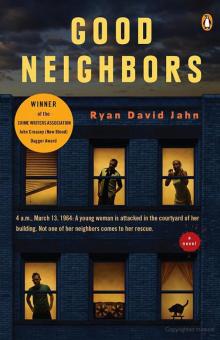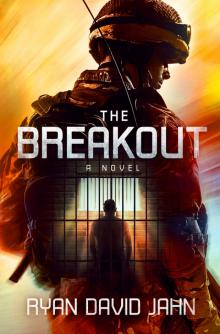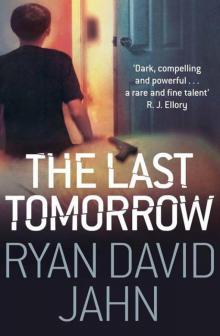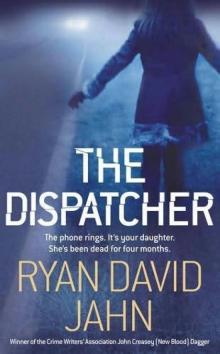- Home
- Ryan David Jahn
Good Neighbors Page 13
Good Neighbors Read online
Page 13
Frank hears a thud, and his car groans, his rear shocks squeak.
What’s going on back there?
Why is he taking so long to find nothing?
Frank closes his eyes.
If he gets through this he may take up smoking fulltime again.
He hears the sound of something metal – he thinks – dropping to the asphalt, and then a whispered, ‘Shit,’ and then a scraping sound, maybe the sound of it – the metal thing that dropped – being picked up.
He looks in the driver’s side mirror but sees nothing on the street-side but empty. He looks in the passenger’s side mirror next, but too late; all he sees is a blue blur of cop disappearing behind his car, hidden by his open trunk’s lid.
He hears a clatter and then silence.
‘Sir,’ the cop says after a while. ‘Sir, would you please step from your vehicle.’
Truth is, he’d rather not, but he pushes the door open and swings his body around, stepping out of the car, closing the door behind him. He cannot see the cop. The cop is hidden by the trunk lid, but he thinks the cop is watching him – no, he knows the cop is watching him.
He doesn’t like this at all.
He exhales and inhales and walks toward the trunk of the car.
Something bad is about to happen and just because he doesn’t know what doesn’t mean he doesn’t know it won’t be pretty. It won’t be pretty for him, anyway. He tries to brace himself for whatever it is, but that’s a hard thing to do, brace yourself, when you don’t know what direction you’re about to fall in.
He walks around the back of his car, around the raised trunk lid, and as soon as he does, the cop grabs Frank by the back of his neck with a rubber-gloved hand – rubber gloves? – and shoves him toward the trunk, shining his flashlight inside it as he does.
‘What the fuck is this?’ the cop says, spittle flying from his mouth.
‘I don’t—’ he begins, but then stops. Because he does. He does know. He knows exactly. And he knows, too, there’s nothing he can say or do to avoid this turning ugly fast.
‘That’s the television you just put in my trunk, sir,’ he says.
The cop slams the flashlight into Frank’s gut, bending him over. He feels the air rush out of his body and he hears himself groaning.
‘Fuck,’ he says, gasping for air.
‘Smart-mouth nigger,’ the cops says. ‘A man was killed in his own home not half a mile from here. Killed with a tire iron. Bludgeoned to death. That tire iron looks like it’s got blood on it to me. Is it yours?’
‘How do you know it was a tire iron he was bludgeoned with?’
Another swing to the gut.
‘Answer the question. Is it yours?’
‘If it’s got blood on it, it’s not.’ Gasping.
‘That’s pretty fucking convenient.’
‘It’s the truth.’
‘It’s in your trunk.’
‘It’s not mine.’
‘Pick it up and take a closer look, and then tell me it isn’t yours.’
Frank is just getting his breath back. He stands up and straightens out, breathing in and breathing out. He looks at the cop. He swallows.
‘Pick it up and take a closer look,’ the cop says again.
‘I will not,’ Frank says. ‘I’m not touching it, sir.’
‘Pick up the fucking tire iron,’ the cop says, more spittle flying from his mouth, some of it splashing on Frank’s neck. Frank does not move to wipe it off.
‘No, sir.’
‘You think you’re smart? Pick up the tire iron or I’ll fucking kill you.’
‘If you kill me, I’ll be dead and you’ll have no one to frame for whatever it is you’re trying to frame me for, sir,’ Frank says. ‘Murder, it sounds like.’
‘You think you’re smarter than me?’
‘No, sir.’
‘You ain’t smarter than me. I got no problem framing a dead man. Fact is, though, I don’t even need you dead. I don’t need you dead and I don’t want you dead. I want to teach you something about mouthing off to your betters, though,’ he says, nodding. ‘I do want that. Smart-mouth nigger. When you wake up, you’re gonna learn something.’
And with that, the cop swings the flashlight at Frank’s head, cracking it across his skull. The flashlight breaks, the plastic shattering, flying off in several directions. The batteries fall out and scatter like cockroaches when the kitchen light’s turned on.
But Frank does not fall.
He is dazed though and is trying to blink the dazed feeling away, trying to blink his vision back into existence, when the cop pulls out his billy club and slams it across his forehead.
This time Frank does fall.
He can feel himself going down, dropping to his knees.
The ground rushes up at him.
He sees a penny, face up, near the back-right tire of his car.
Good luck penny, he thinks.
And then he falls flat on his face and he doesn’t think anything else – not for a while, anyway.
29
Alan looks at the poor stupid motherfucker lying on the ground in front of him. The guy’s face-down on the asphalt, blood leaking from a split in the swelling lump on his forehead.
He’s already working out his story for having to club the guy. He doesn’t need much. He caught the son of a bitch red-handed, the guy resisted arrest, and Alan had to restrain him with force. A lot of force. That’s all. That’ll be plenty. It has been in the past. Who trusts a civilian over a cop? No one. Even civilians don’t trust civilians over cops; put the testimony of a cop against the testimony of a guy who claims he didn’t do it, your honor, I swear, and you get a conviction every time – every fucking time. Especially if the guy’s colored.
Alan slides the billy club back into his belt, bends down, and flips the guy over. Heavy son of a bitch. Alan is lucky he didn’t fight back. He suspects he might have lost that match. Once the guy’s on his back, Alan has to heft the TV back out of the trunk. He’s goddamn tired of hauling it around and he’s glad it’s almost over with. Whoever invented the television should have made it lighter. Jesus. He sets it on the guy’s chest, holding it balanced there with one hand. With his other hand, he grabs the guy’s right arm and presses his fingerprints onto the surface of the television. One set of fingerprints done, he drops one arm, picks up the other, and presses some prints into the other side. Best to be thorough.
With the fingerprints planted on it, Alan puts the TV back into the trunk.
Then he takes out the tire iron. As he’s pulling it out of the trunk, he decides he’ll have to hit himself with it. Once on the arm and once on the neck. Just for safe measure.
Then he’ll drop it by the unconscious colored bastard and call for backup. The guy went for the tire iron, see, hit me, I had to fight him, and I took him down. He almost got away, but I took him down.
Alan nods. That’s how it’ll go, he decides.
He may even get an MPD medal for this.
He grabs the cold metal in his gloved right hand, standing there in the morning darkness by the side of the road. He looks at the sticky blood drying on its surface. He breathes in and out.
‘Okay.’
He swings his fist and the tire iron in it toward his neck, but misses the soft part he was aiming for. The tire iron slams into his jaw and his ear instead – with an audible metal-on-bone crack! – and pain shoots out in every direction from the contact point in a jagged ripple.
He drops the tire iron.
‘God fucking damn it,’ he shouts through gritted teeth as blood begins to leak from his ear. He stomps the asphalt. ‘Fuck!’ He stomps around in an angry, pained circle, then manages to regain his senses. He touches his ear, looks at the blood on his fingertips. He hears nothing but a high-pitched hum in that ear, as if it had an insect trapped inside it.
‘It better be temporary, you fuck,’ Alan says, kicking Frank in the ribs. Frank groans but doesn’t come to.
; Then Alan picks up the tire iron again and holds out his left arm.
‘Okay,’ he says. ‘Try not to break it.’
He licks his lips, looks at the spot on his arm where he plans to hit himself, swallows.
Blood drips from his earlobe and splashes warm on his shoulder.
‘Okay,’ he says again.
Then he swings.
30
Kat is barely standing. She is leaning against the cold stone wall in front of her apartment – hidden in the shadows of her front porch – or she wouldn’t be standing at all; without the wall to lean on, she couldn’t stand. But she is standing. She’s here, only inches from her front door, standing in the shadows. She has no idea how she managed to get here, but here she is.
The man who attacked her stands only fifteen or so feet away. The kitchen knife is in his hand. He stands half in the shadows and half in the light of the courtyard. He turns in a circle, looking for her.
‘I know you’re out here somewhere,’ he says, ‘and I’m gonna find you.’
Kat watches him. He hasn’t looked on the porch yet. She doesn’t know why – it doesn’t make sense – but he hasn’t. Not yet. She has no doubt that he will. Even if he doesn’t, he’s bound to see her movement in the corner of his eye while he looks elsewhere, and it will probably happen sooner rather than later. She can’t just stand here leaning against the outside wall of her apartment; she has to get the apartment door opened without him seeing her. Once she does that, she can just let herself fall inside, kick the door shut, and, hopefully, if she’s got any strength left, she’ll be able to find enough in her to reach up and twist the dead-bolt home. And then she’ll be safe.
But first, the door needs to be opened.
Easy-peasy, she thinks. It’s already unlocked. All she has to do is turn the doorknob – without jingling the keys – and push the door open. That’s all.
She reaches out with a raw shaking and bloody left hand. With her right hand, she grips onto the wall behind her, hoping she doesn’t fall.
The man who attacked her is now out of sight in the courtyard; she can hear him cursing and stomping around.
She can do this. She just has to do it before he comes back out toward the street, that’s all.
‘Where are you, you bitch?’
She can do this.
Her fingers touch the cold metal of the key-scratched doorknob, and she reflexively pulls away, startled by the feeling.
Her nerves are shot.
Just do it, she tells herself. Before he comes back. Please, Kat, just do it.
She reaches out again, wraps her bloody hand around the doorknob.
She can hear the sound of his footsteps coming back.
She looks toward the courtyard. He is walking along the bloody trail she left behind on her way here. She dumbly thinks of Hansel and Gretel. There’s something wrong with her brain. He is going to look up and see her soon. Any second now.
She can’t worry about being quiet anymore.
She turns the doorknob, jingling the keys which stick from it as she does, and she shoves.
The door swings open and Kat falls with the momentum of her shove, face down on her front porch. She tries to scramble inside but she’s so weak she can barely crawl, but she tries, and she manages to get the upper half of her body over the threshold and inside – I’m inside, she thinks, madly, I’m safe – before a hand grabs her by the leg and drags her back out into the early-morning darkness.
‘No,’ she screams, and the word tears at her throat like a jagged stone as it makes its way out of her. ‘No.’
The man pulls her out and into a flower bed in front of the building with one hand, and with the other he brings the knife down. She twists as she tries to escape, and the blade stabs into her calf. And then another stab, this one into her left hip. She can feel the moist soil of the flower bed beneath her.
The sun hasn’t come up, but there are no more stars in the sky.
Gray clouds swarm above her, blocking her view of anything beyond the atmosphere.
Something slides into her stomach.
31
David hasn’t said a word; he’s simply been sitting in the back of the ambulance, thinking.
He thinks of a boy with dark hair and light eyes – a small, pale boy – a boy who likes to sit in his bathtub, even when he’s not taking a bath, and play with his toy cars, pretending the edge of the tub is a roadway, making the noise of a car shifting gear, but the car’s going too fast, oh no, it’s in trouble, it’s gonna lose control, and then it does lose control and it flies off the road which is on a hundredfoot cliff, and it crashes to the bathroom rug below and explodes and the driver screams, ‘Oh, no! My hair’s on fire!’ He thinks of a boy who tries to tell his father what happened to him at school, whose father calls him a liar, tells him not to make things up, tells him he’s grounded for a week for making things up, tells him he’s sick for even thinking up such things. He thinks of a boy who lies in bed afraid to go to school. A boy who stands in the bathroom, at the bathroom counter, grinding soap into his left eye, trying to give himself pinkeye, trying to give himself the appearance of pinkeye anyway, because pinkeye is contagious and they don’t make you go to school when you have pinkeye, and when he’s done his eye is red, so red it looks like it will never be white again, and for three days he gets to stay home with mom and listen to the radio and eat fried bologna sandwiches with the crust cut off. He thinks of a boy who’s grounded for a month when he’s caught grinding soap into his eye, giving himself pinkeye for the fourth time. A boy who packs a suitcase and runs away from home but who really only runs as far as the garage, who crawls up in the attic above the garage and sleeps there for four nights, only going into the house when his parents are gone, going into the house to collect cans of food and go to the bathroom. A boy who in that four days gathers quite a collection of piss-filled Mason jars in the garage attic. A boy who does nothing but sit and read A Princess of Mars by the dim light of the attic’s sole window while his mom cries about her missing son. A boy who gets caught sneaking food from their General Electric Monitor Top refrigerator after his father pretends to leave but really hides just outside the kitchen, looking in through the window. A boy with welts from a razor strop who gets even more welts when his father finds the jars of piss in the attic and tells him he’s disturbed, he’s sick, making up lies about his teachers and saving his urine in jars. That’s what he thinks of as they head toward the hospital, the monster he’s wished dead for twenty-six years on a stretcher not a foot away, strapped down, unable to move, a jagged piece of glass sticking from his forehead like a shelf.
The ambulance pulls to a stop in front of the hospital.
The sirens go silent; the lights stop flashing.
He looks at Mr. Vacanti and the man looks back at him with somehow gentle eyes. It surprises David to see the man has gentle eyes. It surprises him, even at thirty-seven, to discover that monsters can have gentle eyes. Something is terribly wrong with a world where monsters are allowed to have gentle eyes.
‘You’re doing the right thing, Davey,’ Mr. Vacanti says. ‘What I did was . . . unforgivable. I know that. But you’re doing the right thing.’
David clenches his jaw and looks away. He swallows back words. He turns toward the closed back doors of the ambulance, unlatches them, and forces them open.
He’s surprised to see it’s still dark out. It felt like he was in the ambulance for hours – days, weeks – with that monster and his gentle eyes.
With John’s help, he pulls Mr. Vacanti out of the ambulance, and a moment later he and John take him into the hospital.
32
Diane sits on the bed beside a suitcase whose leather jaw is hinged open and whose mouth is full of her clothes, jewelry, memories.
She is holding a photograph in both hands, a framed wedding photograph, nineteen years old. In the photograph she and Larry are young and thin. Larry has all of his hair. None of her skin has begun to s
ag or wrinkle. Both of them have shining eyes: eyes that are shining with the youthful belief that love really can conquer all, and, worse to Diane as she looks at the picture now, that it actually has. Their eyes are shining with the belief that now they are safe. They are together and married and the world will never get to them. It might get to some people, but they’re not some people. They’re Larry and Diane.
They’re safe.
There is a knock at the closed bedroom door.
Diane looks up from the photograph.
‘I told you,’ she says, ‘I don’t wanna talk to you and I can’t stand to look at you.’
‘Please, Diane,’ Larry says in a muffled voice from the other side of the door, ‘just let me come in.’
There is a rattle of doorknob, a futile shove. The door stands firm.
She looks down at the picture and wonders how either of them could ever have been so naive.
‘I’m not letting you talk me into staying,’ she says to the closed door.
‘I don’t want to talk you into anything. I just want to talk.’
‘You don’t want me to stay?’
‘Of course I want you to stay. But this isn’t about talking you into anything.’ Silence, and then a very quiet, ‘Fuck,’ which is, of course, not intended for her; and then, ‘Please. Open the door.’
Diane sets down the photograph, looks at it for a minute longer, and then tilts it down, pressing their smiling faces against the wood of the nightstand. She doesn’t want to have to look at their goddamn innocent faces anymore.
‘Diane?’
‘What?’
‘Please.’
God damn him.
She gets to her feet and walks to the door. She stares at it for a moment and then turns the lock and pulls it open.
Larry is standing there looking at her, a defeated man. His eyes are red. What’s left of his hair is a bird’s nest. He’s wearing no shirt, his flabby white belly simply hanging out, pale and vulnerable. There is desperation in his eyes, in his posture.

 Good Neighbors
Good Neighbors The Breakout
The Breakout The Last Tomorrow
The Last Tomorrow The Dispatcher
The Dispatcher